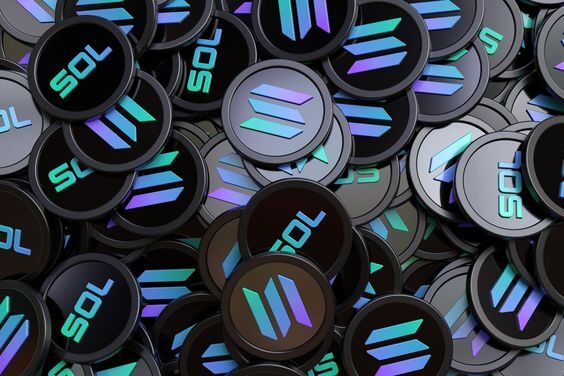Solana is a blockchain platform designed to provide fast, secure, and scalable infrastructure for decentralized applications (dApps) and crypto projects. Unlike some other blockchains, Solana aims to handle high throughput and transaction speeds without sacrificing decentralization or security. It achieves this through innovative technologies such as Proof of History (PoH) and a unique consensus mechanism called Tower BFT (Byzantine Fault Tolerance).
Solana’s high throughput and low transaction fees make it attractive for developers building complex dApps, decentralized finance (DeFi) projects, and non-fungible token (NFT) marketplaces. In essence, Solana aims to be a high-performance blockchain platform that can support the next generation of web3 applications while maintaining decentralization and security.
Table of Contents
Validators in Solana 🫡

Validators are like the guardians of the Solana blockchain – they’re the ones making sure everything runs smoothly and safely. Think of them as watchful protectors, keeping an eye on every transaction that happens on the network. They check if each transaction follows the rules and comes from the right place, just like how a teacher checks if your homework is done correctly.
Now, when it’s time to add new transactions to the blockchain, validators step up to create new blocks. It’s like they’re building the next part of a digital puzzle, piece by piece. And because Solana uses a special system called Proof of Stake, validators who have more SOL tokens get the chance to build these blocks. It’s kind of like giving the best players in a game more chances to score goals.
But it’s not just about adding transactions – validators also work hard to keep the network safe from bad guys. They team up to make sure no one messes with the blockchain, protecting it from hackers and cheats. And to top it off, each validator keeps track of all the accounts and their balances on the network. It’s like they’re the librarians of the digital world, making sure everyone has the right information at all times.
Also Read ➤ ➤ How to get FREE Bitcoin in 2024 – Guide
Now, why are validators so important? Well, imagine if there were no validators – the blockchain wouldn’t be able to function properly. Transactions might not go through, or worse, someone could tamper with the records. Validators help keep the Solana network up and running smoothly, making sure everyone’s transactions are secure and accurate.
And here’s the cherry on top – validators get rewarded for their hard work. Users can lend them their SOL tokens, and in return, the validators share a part of the rewards they earn from creating new blocks. It’s like being part of a team where everyone wins together.
So, next time you hear about validators in Solana, remember they’re the unsung heroes keeping the blockchain safe and sound, one block at a time.
How do they work?
In the Solana network, validators play a critical role in ensuring the integrity, security, and decentralization of the blockchain. They are responsible for validating transactions, participating in consensus mechanisms, and generating new blocks. Solana implements unique consensus mechanisms like Proof of History (PoH) and Proof of Stake (PoS), where validators stake SOL tokens to secure the network and contribute to block creation.
Validators operate independently, thereby preventing single points of failure and enhancing network resilience against attacks. They are incentivized through transaction fees and staking rewards. Becoming a validator requires technical expertise, robust hardware, and staking SOL tokens, with specific hardware requirements including CPU, RAM, disk space, and internet speed.
Also Read ➤ ➤ Top 10 Blockchain Security Software
Setting up a validator node involves installing Solana software, configuring the node, generating key pairs, creating a vote account, and optimizing system settings. Validators ensure network security, governance, and performance, contributing to Solana’s high throughput, low latency, and ecosystem support through transaction processing and staking.
Despite facing challenges such as network outages and the need for high-performance hardware, validators remain crucial for Solana’s future. They continue to play a central role in processing transactions, implementing upgrades, and contributing to network growth. As Solana evolves, validators will play an increasingly important role in sustaining the network’s speed, security, and scalability.
Requirements for being a solana validator
Becoming a validator on the Solana network requires meeting specific hardware and software requirements, along with a commitment to maintaining a secure and continuously online node. Here are the key requirements:
Hardware Requirements
- CPU: A modern CPU with at least 12 cores (24 threads), a base clock speed of 2.8GHz or faster, support for SHA extensions (AMD Gen 3 or newer, Intel Ice Lake or newer), and AVX2 instructions.
- RAM: A minimum of 256GB of RAM is recommended, preferably ECC memory, with support for up to 512GB on the motherboard.
- Disk Space: A PCIe Gen3 x4 NVME SSD or better with at least 500GB for accounts and 1TB for the ledger.
- Internet Connection: A minimum of 1GBit/s symmetric speed is necessary, with 10GBit/s preferred for optimal performance.
Software Requirements
- Solana Software: Install and configure the Solana software on your machine to connect to the Solana testnet or mainnet.
- Staking SOL Tokens: Validators are required to stake SOL tokens (the native cryptocurrency of the Solana network) as a form of security and investment in the network’s well-being.
- Setting Up and Running a Node: Install Solana software on your server and configure it according to the network’s requirements. Securely log into your server, prepare it with the latest updates, and set up the necessary hard drives for the ledger and accounts database.
- Key Generation: Create a validator keypair, a vote account keypair, and an authorized withdrawer keypair. These keypairs are crucial for your identity on the network and for securing your operations.
- Vote Account Creation: Set up a vote account, which is essential for participating in the consensus mechanism.
- System Tuning: Optimize your system settings to accommodate the demands of running a validator node. Meeting these requirements and following the necessary steps will enable you to become a validator on the Solana network.
Also Read ➤ ➤ How To Choose Right Crypto Exchange For You?- Guide
Problems and Scope
- Technical Complexity: Running a validator node requires technical know-how and a deep understanding of Solana’s network structure. Validators have to deal with complex setups, software configurations, and hardware optimizations.
- Hardware and Infrastructure Costs: Keeping a high-performance node running requires sturdy hardware and a dependable internet connection, which can mean significant upfront and ongoing expenses for validators.
- Network Outages and Congestion: Validators might run into issues like network outages or congestion, affecting their ability to validate transactions and take part in consensus. These problems can impact node performance and network reliability.
- Security Risks: Validators are potential targets for cyberattacks like DDoS attacks and attempts to breach their node’s security. Making sure they have adequate security measures is crucial for protecting the network’s integrity.
- Economic Risks: Validators stake SOL tokens as part of their role, which comes with financial risks. Fluctuations in the market and disruptions in the network can affect the value of staked tokens and validator rewards.
Also Read ➤ ➤ 9 Must Watch Blockchain Videos For Beginners (Free)
Future Opportunities
- Increased Decentralization: With more individuals and organizations becoming validators, Solana’s network becomes more decentralized and resilient. This strengthens the network’s security and resistance to censorship.
- Technological Advancements: Continuous improvements in hardware and software technology can boost validator efficiency and performance. Innovations like optimized consensus algorithms and better network protocols can enhance Solana’s scalability and reliability.
- Incentive Enhancements: Future developments could introduce more sophisticated reward mechanisms for validators, encouraging greater participation and investment in the network. This might include new staking models, improved rewards, and additional incentives for network contribution.
- Regulatory Adaptation: As regulations evolve, validators may need to adjust to comply with new requirements. Clearer regulations could provide more certainty for validators and encourage wider adoption of Solana’s network.
- Community Governance: Validators are likely to play a more active role in network governance, contributing to decision-making processes and protocol upgrades. Increased community involvement can promote consensus and drive innovation within the Solana ecosystem.
- Interoperability: Solana validators may engage in cross-chain interactions, facilitating seamless asset transfers and interoperability between different blockchain networks. This expands Solana’s ecosystem’s utility and reach, unlocking new possibilities for decentralized finance (DeFi) and other applications.
- Environmental Sustainability: Validators may adopt eco-friendly practices like using renewable energy sources for node operations. This aligns with global sustainability goals and enhances Solana’s reputation as an environmentally conscious blockchain platform.
- Education and Training: The demand for educational resources and training programs for validators is expected to grow. Better learning opportunities can equip validators with the knowledge and skills needed to navigate the evolving blockchain technology landscape.
By addressing these challenges and seizing future opportunities, Solana validators can play a vital role in the network’s development, security, and sustainability, shaping the future of decentralized finance and blockchain innovation.
Also Read ➤ ➤ How to buy new Crypto before listing? | Check NOW!
Conclusion
In conclusion, Solana validators serve as the backbone of the Solana blockchain network, ensuring its integrity, security, and decentralization. Through their meticulous validation of transactions, active participation in consensus mechanisms, and generation of new blocks, validators contribute significantly to the network’s efficiency and reliability.
While becoming a validator entails meeting specific hardware and software requirements and navigating technical complexities, it also presents lucrative opportunities for rewards and active participation in network governance. However, validators face challenges such as high infrastructure costs, potential security risks, and the need to adapt to evolving regulatory frameworks.
Looking ahead, Solana validators stand poised to capitalize on future opportunities, including technological advancements, increased decentralization, and enhanced incentive mechanisms. By embracing these opportunities and overcoming challenges, Solana validators will continue to play a pivotal role in shaping the future of decentralized finance and blockchain innovation.






